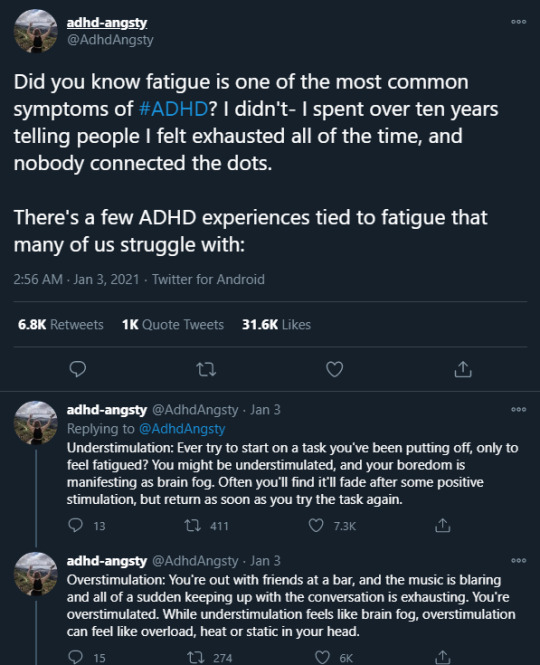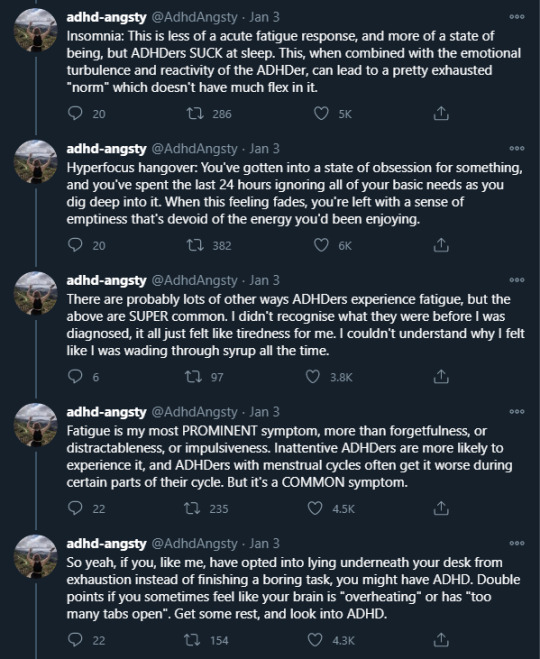Neurodiversity and Neurodivergence
Last active 60 minutes ago
Don't wanna be here? Send us removal request.
Text
Moving forward: a call for Critical ADHD Studies
Abstract
Highly effective early autistic activism gave considerable impetus to changes in the way autism research is conceived and carried out, notably through Critical Autism Studies (CAS). Little, though, has been similarly formalised challenging pathology-driven views of other forms of neurodivergence in research. However, there are increasing signs that this is changing, perhaps most particularly concerning ADHD. Here, we propose a tentative outline for what a Critical ADHD Studies – drawing on, bleeding into, and yet retaining its own specificities from both CAS and emergent Neurodiversity Studies – might resemble. This is neither a gate-keeping exercise nor a definitive mapping out of a field. Neither is ‘critical’, here, concerned with discussion of the validity of ADHD diagnoses. Rather, we seek points of intersection and of potential ally-ship, pulling together approaches centring ADHD lived experience, depathologisation, and ADHD affirmative world-making with related fields such as CAS and Neurodiversity Studies.
1 note
·
View note
Text
The Canadian Journal of Autism Equity

https://mulpress.mcmaster.ca/cjae
1 note
·
View note
Text
Not to be a technical writer on main, but I've been bumping into the idea lately that the only reason explaining yourself in more detail never seems to work is because neurotypical people are misunderstanding you on purpose, or because they have short attention spans, or because they just hate listening to you talk – and sure, occasionally that's even true, but most of the time the problem you're running into is more fundamental.
Every time you add more detail, you're running the risk of tripping over a bad assumption on your part about the listener's prior knowledge, or hitting the tipping point where they become overwhelmed with new information (and remember that you don't know which parts of what you're saying will be new information for them), or making a leap of logic that isn't as self-evident as you think it is, or any of a dozen other potential snags which, by definition, you will not see coming until it's too late to correct course.
Basically, every piece of information you add multiplies the odds of you getting blindsided by some vector of misunderstanding you didn't anticipate, even as it addresses the ones you did anticipate. The point of diminishing returns where continuing to elaborate increases the odds of unexpected miscommunication more than it decreases the odds of expected miscommunication is much nearer than you'd like.
The most effective act of communication is not the one which contains the most possible information, but the one which contains the smallest amount of information it possibly can while still getting its point across. It sucks, but it's the reality of the situation. People far more autistic than you have been trying for hundreds of years to invent a way of communicating which doesn't work this way, without success.
All of which is to say that "getting to the damn point" is legitimately a communication skill, not just an accommodation for people who aren't paying attention. If it's any consolation, it's something neurotypical people struggle with just as much as anyone else – if it was easy, technical writers wouldn't have jobs!
15K notes
·
View notes
Text


bro im gonna CRY i didnt know this 🥺
76K notes
·
View notes
Text
we’reくコ:彡 entering squid territory
くコ:彡 くコ:彡 くコ:彡 くコ:彡 くコ:彡 くコ:彡 くコ:彡
585K notes
·
View notes
Note
do you have any writings on plurality you recommends?
check out my plurality tag for readings!
i wrote extensively about plurality and alterhumanity in my dissertation, and used these sources, among others (long list of citations copied and pasted directly from my dissertation bibliography below the cut):
bear, kitty lu. 2023. (un)sane: a collective story | a collection of stories. Listening House Media.
cárdenas, micha. 2016. “Dilating Destiny: writing the transreal body through game design.” Jump Cut no. 57. https://ejumpcut.org/archive/jc57.2016/-cardenasDilatingDestiny/text.html.
cárdenas, micha. 2017. Imagining a Trans World. Ada: A Journal of Gender, New Media, and Technology. 12. doi:10.13016/M2MK6594D.
cárdenas, micha. 2011. The Transreal: Political Aesthetics of Crossing Realities. Atropos Press.
The Chimera System. 2022a. Our Lack of An Awakening & Our Nonhumanity In Childhood. The Chimeras Library. Sept 24. https://drive.google.com/file/d/1dGCguvY_4YZ2t-N2B5CFNpp6NbM0Trjx/view.
The Chimera System. 2022b. Our Nonhuman Experiences. House of Chimeras. Feb. 5. https://sites.google.com/view/houseofchimeras/our-nonhumanity/nonhuman-experiences.
The Interstellar System. n.d. Plural FAQ. The Interstellar System. https://interstellarsystem.weebly.com/plural-faq.html.
The Interstellar System, Archie. 2022. Our Personal Alterhuman Timeline. The Interstellar System. Jan 19. https://interstellarsystem.weebly.com/our-personal-alterhuman-timeline.html.
Lee, LB. 2020a. Quick'n'Dirty Plural History… Part 1 (1811-1980ish). Scribbles and Bits. May 28. https://lb-lee.dreamwidth.org/1111069.html.
Lee, LB. 2020b. Plural Group History, 1989-Present - PluralPWC (CC). plural events. 1:30. https://www.youtube.com/watch?v=I8Nc-qkt_l4.
Lee, LB. 2020c. “Plural History, part 3: Usenet and its spin-offs and Soulbonders.” Scribbles and Bits. July 30. https://lb-lee.dreamwidth.org/1120824.html.
mordecai. 2018. you are the sum of your friends. Allium House. https://allium.house/sun/creations/sum-of-your-friends.php
moss, alan. n.d. Who is a System? Theory and Terminology. mix moss. https://mixmoss.neocities.org/systems.
The Promethean House. N.d. Welcome. Ex Uno Plures. https://www.exunoplures.org/main/.
The Promethean House. 2023. “What We Believe.” Ex Uno Plures. https://www.exunoplures.org/main/what-we-believe/
vagabond-sun, mord. 2016. “How I learned to stop worrying and love ontological ambiguity.” Alt+H. Sept. 27. https://blog.alt-h.net/post/151023733082/. Archived at https://web.archive.org/web/20230314212907/https://blog.alt-h.net/post/151023733082/how-i-learned-to-love-ontological-ambiguity. A version is also available at allium.house: https://allium.house/sun/creations/ontology.php.
vagabond-sun, mord. 2017. “there are voluntary alterhuman identities.” Tumblr. Jan. 2. https://vagabond-sun.tumblr.com/post/155301734375/there-are-voluntary-alterhuman-identities.
70 notes
·
View notes
Text
"We hope you understand why people shouldn’t use generative AI for plain language. But there are other AI tools that can be helpful for plain language. Reading level checkers like Readable or Hemingway are not generative AI. They show specific words or sentences that are a high reading level. But they don’t replace words for you, or tell you what words to use. It is up to you to make the changes you need to make your writing accessible. These tools are helpful because they give advice, but don’t change things for you. We think people should only use these kinds of AI tools for plain language.
People writing in plain language should always talk to disabled people first. People with disabilities can give feedback to make stronger plain language papers. We do not need AI to do this work when we already know disabled people can. Nothing about us without us!"
0 notes
Text
This is a survey to understand how autistic people use and understand language. @neurodivergent-mermaid, a nonverbal autistic person, gave me the idea and helped me word some of the questions.
The survey is for everyone who has or might have autism, including those who suspect autism but aren't diagnosed with it. This survey is just for fun, not research!
Page 1 is about how well you can talk and write. This includes how often you go mute and if you can talk during meltdowns.
Page 2 is about how well you can understand language.
Page 3 is about other conditions that you might have that can affect your language.
Page 4 is about your developmental history. This includes when you started talking and if you've had speech therapy.
Page 5 is about demographics. It asks your autism diagnosis, age, gender, and ethnicity.
You can skip any questions that you do not want to answer. You can stop taking the survey at any time. If you do not submit the survey, no one will see your responses. The survey is completely anonymous; no one will know if you took the survey or what your responses are.
When I have enough responses, I'll post them here!
414 notes
·
View notes
Text
0 notes
Text
“There is Nowhere Else That I’d Rather be Than with Them”: Parents’ Positive Experiences Parenting Autistic Children
Background and Aims
A significant body of research focuses on the negative outcomes of parenting Autistic children, particularly when parents identify as non-Autistic. Less attention has been paid to the experiences of Autistic parents of Autistic children, and even less to the positive or fulfilling elements of parenting Autistic children, regardless of parent neurotype. This study therefore asked: What do parents value about their Autistic children, and what characterizes parents’ positive relationships with their Autistic children?
1 note
·
View note
Text
1 note
·
View note
Text
(2016)
One research tool that has angered and frustrated me for years, is Simon Baron-Cohen’s “Reading The Mind in the Eyes” test. It is most often used to show that autistic people lack empathy and the ability to figure out what other people are thinking and feeling based on body language and facial expressions. Unfortunately, the test has very little real validity: It measures all kinds of things it claims it doesn’t measure, and fails to measure the things it claims to measure. And very few people understand this. They take Simon Baron-Cohen at his word, especially because he’s a Big Name Autism Expert. But he became a Big Name Autism Expert with research that for the most part is just as bad as this test
So for a long time, I’ve wanted to tell people what I thought was wrong with the test. The way I experience it, I feel all the wrong things at once. That makes it extremely difficult to communicate. I feel the urgency of how wrong it is and how that wrongness is affecting autistic people around the world on a daily basis.
1 note
·
View note
Text
i was a kid asking questions like "when you say to rate my pain on a scale of 1 to 10 do you mean relative to what i have experienced before or what i could theoretically experience in the future because what if i say 8 and then later i get twenty billion papercuts and i realise relative to that this pain is a 1" and they would reply "just focus on what you know, you literally had your foot ran over by a ford focus" and id say "well exactly but it could have been both feet which i know would surely be worse" and it still took years to diagnose me as autistic
57K notes
·
View notes
Text
The Double Empathy Reader brings together a substantial collection of work from leading researchers, theorists and practitioners, with first-hand accounts of neurodivergent people, to explore this growing area of study within the neurodiversity movement.
This comprehensive handbook explores Damian Milton’s ‘double empathy problem’: the breakdown in mutual understanding that can happen between any two people yet is more likely to occur when people of differing dispositions attempt to interact. It challenges the traditional view that in exchanges between autistic and non-autistic people, this breakdown was simply the result of autistic people being inherently deficient in empathy. Thirteen years after the theory was first published, The Double Empathy Reader brings together an important volume of work to explore the research that has developed in that time as well as the many gaps in our understanding that still exist, with the aim to understand the potential of this theory to aid a reframing of autism itself and the radical change this could bring when considering best practice models for supporting autistic people in different settings. This title is the first in a new ‘Readers in Neurodiversity’ series, which follows Milton et al’s The Neurodiversity Reader, first published in 2020. In keeping with this earlier collection, this new volume also explores how the concept of the ‘double empathy problem’ may be of use in wider theory and practice regarding neurodiversity.
1 note
·
View note